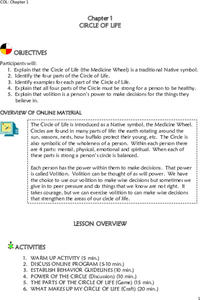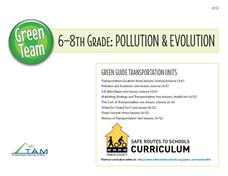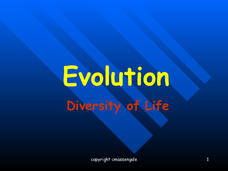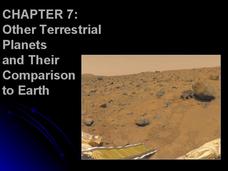Howard Hughes Medical Institute
Deep History of Life on Earth
Take it all the way back! Young scientists discover the changes that took place from the time Earth became solid to present day through an interesting interactive. The resource guides users through key events that have shaped our world...
Biology Junction
Origin of Life
Aristotle explained the idea of spontaneous generation, a concept which lasted almost 2,000 years before scientists proved it wrong. Scholars learn about the history of our understanding of the origins of life. They read examples of...
Healthy Native Youth
Chapter 1: Circle of Life
Volition, or will-power, is the focus of a lesson that brings forth the Native symbol, the Circle of Life, to instill the importance of responsible decision-making. Scholars take part in six activities that empower them to reflect on...
Safe Routes to School
Pollution & Evolution
Bring together a study of two major scientific topics with a lesson on the relationship between pollution and evolution. With the help of a PowerPoint presentation, hands-on activity. and class demonstration young scientists learn how...
Howard Hughes Medical Institute
Geological History of Oxygen
Earth didn't always have oxygen, so what caused the change that allows humans to live here? Learn about the change in O2 levels throughout geological history through an interactive graph. Each section offers greater detail on the changes...
Biology Junction
Evolution – Diversity of Life
Scientists noticed animals with backbones share similar bone structure despite having different forms, such as fins, arms, and wings. Young scientists gain an appreciation for evolution by understanding the history of the theory. They...
NOAA
Plankton
Dive into the world of plankton. The 17th installment of a 23-part NOAA Enrichment in Marine sciences and Oceanography (NEMO) program introduces different types of plankton. Young scientists then use what they have learned to classify...
American Museum of Natural History
Journey to Deep Sea Vents
Take a deep dive into oceanography. The online interactive allows for learners to board a submersible to dive to the bottom of the ocean to investigate sea vents. On the way down, individuals see different marine life at different...
NASA
Water Works on a Blue Planet
Keep within a water budget. Learners find out that less than 2.5% of Earth's water is available to drink—and that there is a fixed amount of water. Scholars read an interesting article comparing the available water to a game of Monopoly...
NASA
Let's Investigate Mars
Take your science class on a hypothetical field trip to Mars with an engaging astronomy lesson. After first learning about NASA's Mars rover missions, young scientists plan their own scientific investigations of Earth's nearest neighbor.
Scholastic
Perfect Postcards: California
It's time to hear about some adventures in travel! The Transcontinental Railroad changed life and travel in the United States during the 1800s. Practicing online research skills, pupils discover the features they would like to visit on...
American Museum of Natural History
A Whale of a Tale
What's the most interesting fact about a blue whale? Learners read an interview about the similarities between the Titanosaur and the blue whale displays at the American Museum of Natural History. Pupils learn not only about blue whales...
K12 Reader
Uncle Tom’s Cabin: George’s Speech
Sometimes it takes a work of fiction to demonstrate nonfictional tragedies and events. George, an escaped slave, describes to Mr. Wilson the hardships of his life in a short passage from Harriet Beecher Stowe's novel, Uncle Tom's Cabin.
National Park Service
Maltese Cross Cabin
The Maltese Cross Cabin, a frontier residence of Theodore Roosevelt, is a time capsule that commemorates Roosevelt's time in the Dakota territory. An explanatory video and response guide takes students on a virtual tour of the wooden...
NOAA
I Can't Breathe!
The Gulf of Mexico dead zone, an area of low oxygen that kills marine life, costs the United States $82 million every year. Young scientists research anoxic ocean environments then come up with a hypothesis for the cause of the Gulf of...
NET Foundation for Television
1850-1874 Native Americans and Settlers
Did Western settlers receiving free land from the Homestead Act realize it wasn't really free at all? Scholars investigate the impact Western expansion had on Native American culture in the mid-1800s. They use documents, timelines, and...
Channel Islands Film
Once Upon a Time (Sa Hi Pa Ca): Lesson Plan 3
What was the most significant tool used by the Chumash? How did the environment make the tool possible? What group behaviors allowed the Chumash be be successful for thousands of years? After watching West of the West's documentary Once...
National Energy Education Development Project
Exploring Oil and Gas
The United States consumes more oil than any other country, about 1.85 billion barrels (or 77 billion gallons) a day. Viewers learn about the history of fossil fuel exploration and how they are formed in an informative presentation. They...
Energy for Keeps
The Energy Times
Extra! Extra! Read all about past and present energy use in a classroom-made historical newspaper. Useful as a cross-curricular assignment between science, history, and language arts, the project is sure to get young journalists...
Workforce Solutions
A Colony for Lunar Living
Two lessons explore the possibility of living on the moon. First, scholars read various scenarios to identify which careers would best transfer to life in space. Finally, pupils examine a website to locate items made for outer space,...
Columbus City Schools
Diversity of Living Things
Here's a topic classes can really dig—the fossil record. Use the well-organized and thoughtful road map to take eighth graders back in time to unearth the answer. Learn how our climate has changed, and how organisms have changed along...
Tutankhamun
Pharaohs, Pyramids and the World of the Gods
Your young historians will learn all about the pharaohs, pyramids, and gods of ancient Egypt with these informational text worksheets, each of which are accompanied by hands-on, follow-up activities.
Glynn County School System
Terrestrial Planets
Mercury, Venus, Earth, and Mars are collectively known as the terrestrial planets. Although part of the same group, each planet has its own set of characteristics. Scholars explore the characteristics that make the planets unique and...
American Museum of Natural History
What's This?: Early Humans
Early humans crafted shelters out of whatever materials they could find. A one-question quiz asks learners to identify the type of bones used to construct the hut pictured in a display.

























